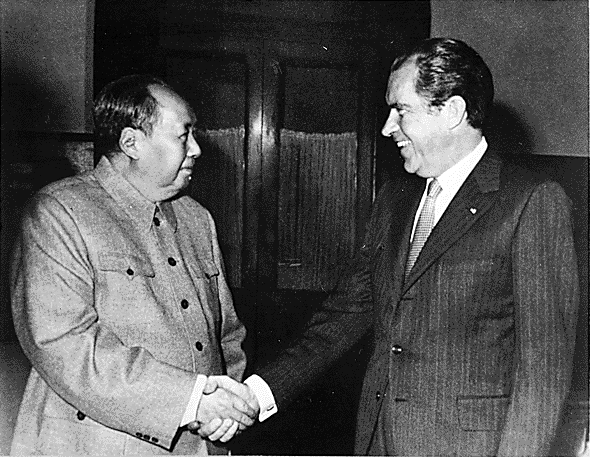Good morning, Whitewater.
Saturday in town will bring a twenty-percent chance of snow showers with a high of twenty-eight. Sunrise is 6:41 and sunset 5:34, for 10h 52m 46s of daytime. The moon is a waxing crescent with 9.5% of its visible disk illuminated.
On this day in 1972, Nixon arrives in China:

Before even being elected president, Richard Nixon had talked of the need for better relations with the PRC, with which the U.S. did not maintain diplomatic relations as it recognized the government of the Republic of China on Taiwan as the government of China. Early in his first term, Nixon and National Security Adviser Henry Kissinger began sending subtle overtures hinting at warmer relations to the PRC government. After a series of these overtures by both countries, Kissinger flew on secret diplomatic missions to Beijing, where he met with Premier Zhou. On July 15, 1971, the President announced that he would visit the PRC the following year.
Occurring from February 21 to 28, 1972, the visit allowed the American public to view images of China for the first time in over two decades. Throughout the week the President and his most senior advisers engaged in substantive discussions with the PRC, including a meeting with Chairman Mao Zedong, while First Lady Pat Nixon toured schools, factories and hospitals in the cities of Beijing, Shanghai and Hangzhou with the large American press corps in tow. Nixon dubbed the visit “the week that changed the world.”
The repercussions of the Nixon visit were vast, and included a significant shift in the Cold War balance, pitting the PRC with the U.S. against the Soviet Union. “Nixon going to China” has since become a metaphor for an unexpected or uncharacteristic action by a politician.
On this day in 1918, Wisconsin’s Assembly stands with La Follette:
…a move to denounce Sen. Robert La Follette and the nine Wisconsin congressmen who refused to support World War I failed in the State Assembly, by a vote of 76-15. Calling LaFollette “disloyal,” the amendment’s originator, Democrat John F. Donnelly, insisted that La Follette’s position did not reflect “the sentiment of the people of Wisconsin. We should not lack the courage to condemn his actions.” Reflecting the majority opinion, Assemblyman Charles F. Hart retorted that “The Wisconsin State Legislature went on record by passing a resolution telling the President that the people of this state did not want war. Now we are condemning them for doing that which we asked them to do.” [Source: Capital Times 2/21/1918, p.1]
